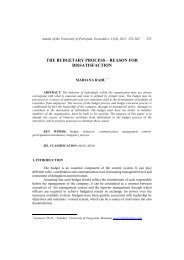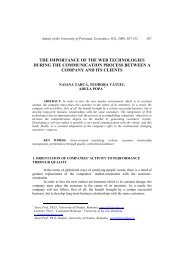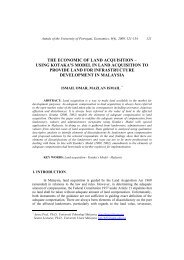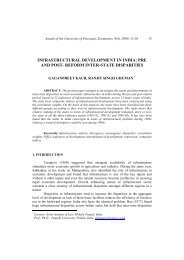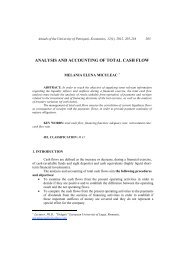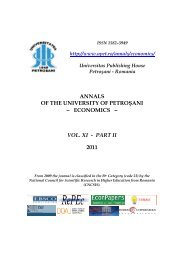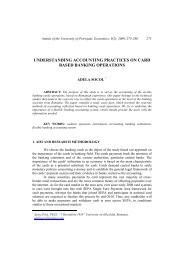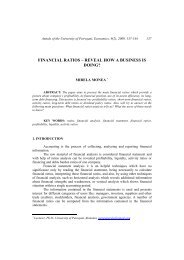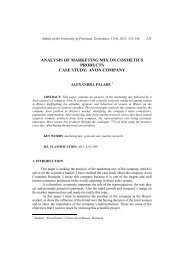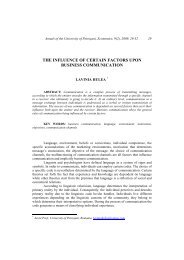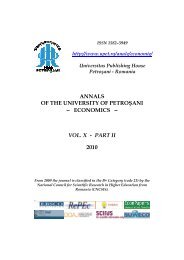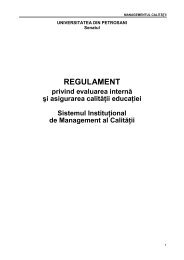annals of the university of petroÅani â¼ economics â¼ vol. xi - part i ...
annals of the university of petroÅani â¼ economics â¼ vol. xi - part i ...
annals of the university of petroÅani â¼ economics â¼ vol. xi - part i ...
You also want an ePaper? Increase the reach of your titles
YUMPU automatically turns print PDFs into web optimized ePapers that Google loves.
Human Capital and Higher Education in Romania in <strong>the</strong> Last Years 211<br />
This situation can be explained, on one hand, by <strong>the</strong> ine<strong>xi</strong>stence <strong>of</strong> a<br />
correspondence between <strong>the</strong> educational (too much <strong>the</strong>oretical) level and <strong>the</strong><br />
requirements <strong>of</strong> <strong>the</strong> labour market, and, on <strong>the</strong> o<strong>the</strong>r hand, by <strong>the</strong> companies’<br />
desire to employ qualified labour force. The lower unemployment rate among<br />
young people with higher education, in comparison with o<strong>the</strong>r categories, as well<br />
as <strong>the</strong> fact that <strong>the</strong> smaller <strong>the</strong> necessary period for finding a work place, <strong>the</strong> higher<br />
<strong>the</strong> educational level is, brings an increasing importance to <strong>the</strong> diploma at <strong>the</strong><br />
beginning <strong>of</strong> <strong>the</strong> career.<br />
Spain registered in 2010 <strong>the</strong> highest unemployment rate, with a percentage<br />
<strong>of</strong> 41.6%, and Holland <strong>the</strong> lowest one.<br />
Employment rate among young people (15-24 years old) is much lower<br />
than that <strong>of</strong> <strong>the</strong> total population, because many young people are still included in<br />
<strong>the</strong> educational system and don’t have a work place. On <strong>the</strong> o<strong>the</strong>r hand, <strong>the</strong><br />
decrease in young people employment can also be determined by <strong>the</strong>ir migration<br />
abroad, <strong>the</strong> decrease in <strong>the</strong> birth rate and <strong>the</strong> black economy.<br />
The number <strong>of</strong> a state faculty graduates increased from 80,000 in 2004 to<br />
140,000 in 2007, but decreased in 2008 (Table 2, Source: The Statistical Annuary<br />
<strong>of</strong> Romania, 2005-2010). The biggest increase was registered in 2007, when <strong>the</strong><br />
number <strong>of</strong> graduates increased by 50,000 persons compared with 2006. In 2008,<br />
<strong>the</strong> number <strong>of</strong> a state faculty graduates decreased at both <strong>the</strong> state faculties, and <strong>the</strong><br />
private ones, but in a higher proportion in <strong>the</strong> first compared to <strong>the</strong> latter ones<br />
(Popovici, 2011, pp. 476-478).<br />
Table 2. The E<strong>vol</strong>ution <strong>of</strong> <strong>the</strong> Graduates Number (persons)<br />
University year<br />
2004/2005 2005/2006 2006/2007 2007/2008 2008/2009<br />
Faculties graduates<br />
Private faculties graduates 25736 26336 33839 88028 91803<br />
State faculties graduates 82739 85908 91660 144857 123023<br />
Source: The Statistical Annuary <strong>of</strong> Romania, 2005-2010<br />
3. HIGHER EDUCATION AND RESEARCH ISSUES IN ROMANIA<br />
Romania signed <strong>the</strong> Bologna Declaration (2000), which aimed to form until<br />
2010 a unique European space in <strong>the</strong> higher education and research field. Despite <strong>the</strong>se<br />
assumed engagements - and <strong>part</strong>ly because <strong>of</strong> such reforms - we could still notice a<br />
continuous process <strong>of</strong> degradation <strong>of</strong> <strong>the</strong> Romanian higher education.<br />
Therefore new (foreign) focus replaced our old European thinking, built on<br />
long term thinking, on investment, including <strong>the</strong> investment in intellect: <strong>the</strong> Anglo-<br />
Saxon way <strong>of</strong> thinking is focussed on goals (targets), mostly on short run goals. Such a<br />
(re)orientation on short term can lead, at least in our case, to <strong>the</strong> loss <strong>of</strong> causality.<br />
Moreover, it could lead to a narrow, purely economic or hedonistic, rationality <strong>of</strong><br />
Anglo-Saxon type. And we should not generalize <strong>the</strong> performance <strong>of</strong> <strong>the</strong> Anglo-Saxon<br />
thinking (and teaching) system: we are not less valuable and, <strong>the</strong>n, we should keep our



